There have been only a few movies that have held my attention even after the credits, leaving me deep in thought about what I had just experienced. Tarkovsky’s “Stalker” is one such film that has had that effect on me. And when I watched The Seventh Seal, I was captivated the same way. It brought to mind a quote from David Lynch, known for his distinct style in works like “Twin Peaks” and “Eraserhead,” where he discussed how Tarkovsky heavily influenced his unique artistic approach:
“I don’t know why people expect art to make sense, they accept the fact that life doesn’t make sense.”
This quote resonated with me because in “The Seventh Seal,” the characters are each grappling with their own quest to comprehend life amidst the harsh backdrop of the 14th-century black plague. It’s remarkable that this film, created in the 1950s, continues to hold relevance and relatability for many people today. It has attained legendary status and is often regarded as a work of art. Serving as a portrayal of humanity’s struggle with mortality, the film’s iconic depiction of chess as a battleground for one’s soul is deeply profound. Through “The Seventh Seal,” Bergman taught me valuable lessons about life, death, and the essence of a truly remarkable cinematic experience.
In my previous blog post, I mentioned Memento Mori, which is a reminder of death’s inevitability, often portrayed symbolically or artistically. Now, let’s delve deeper into this concept and its connection to the film. But first, let’s explore the inspiration behind Bergman’s work and the film’s plot.
A Swedish painter named Albertus Pictor created a monumental painting titled “Death Playing Chess.” If you search for “Death Playing Chess” online, you’ll likely come across a side-by-side comparison of Pictor’s painting and a scene from Bergman’s film. Being Swedish himself, Bergman drew inspiration from Pictor’s artwork to create his masterpiece.
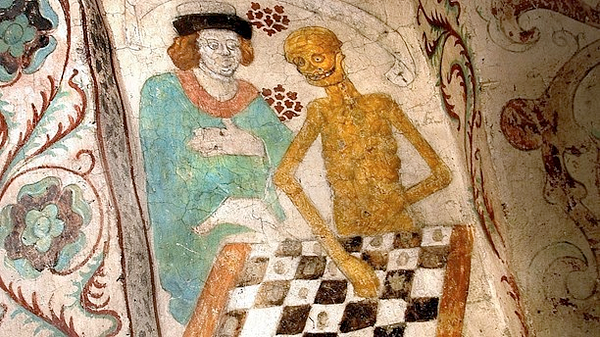
“The Seventh Seal” is a film centered around a game of chess between Antonius Block and Death. After returning from The Crusades and witnessing the devastating impact of the black plague on his homeland, Antonius encounters Death and challenges him to a chess match as a means to delay his own fate. This decision stems from Antonius’ doubts about the afterlife and his questioning of both God and his role as a Crusader. Bergman’s depiction of a man engaging in conversation with Death has since become an influential and often parodied image in other films, including “Bill and Ted’s Bogus Journey” and even “The Muppets.”
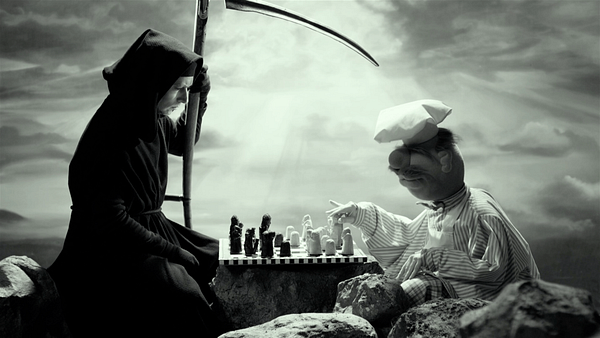
What makes “The Seventh Seal” remarkably effective is its blend of humor and self-awareness. Bergman’s script presents Death as an ordinary individual without poetic monologues, emphasizing the stark reality of the situation. Death agrees to the chess match because it amuses him, knowing that there is no escape from his grasp. From Death’s perspective, why not let Antonius grapple with his spiritual turmoil?
Antonius, Bergman, and myself share a common trait: questioning the existence of God. Bergman, raised Lutheran, and I, raised in a strong charismatic Christian education system despite being Muslim, have experienced our own journeys of doubt. However, Antonius, having fought in The Crusades, has the most at stake in terms of his faith. The film explores his spiritual dilemma, which resonates with me as I’ve personally encountered my own rational doubts. I refer to this as the film’s spiritual dilemma. It’s possible that you may not have experienced such a dilemma (which I consider fortunate), but Bergman acknowledges that everyone has different perspectives on the existence of God and the concept of death. Most importantly, he recognizes that everyone, at some point in their lives, contemplates these profound questions.
Antonius’s squire, Jons, serves as a representative of an alternative perspective in the film. Unlike Antonius, Jons does not grapple with the spiritual dilemma but instead focuses on aiding others and forming connections. When confronted with thoughts of death, Jons finds solace in the belief of an empty nothingness that follows. Jons is not only a humorous character, providing some of the film’s most memorable lines, but he also embodies a perspective on death that I personally admire and wish to possess.

Despite being a film centered around death, “The Seventh Seal” is rich with humanity, as the characters Antonius and Jons encounter various individuals on their journey home. Each character represents a unique perspective on life and death, offering viewers a relatable figure. As the film confronts us with the reality of mortality, we are prompted to contemplate our own reactions and emotions in the face of death. Would we feel confident or scared? Bergman fearlessly poses these existential questions, aiming to unsettle the audience. The 14th-century setting, amidst the dread of the plague, intensifies the film’s exploration of existentialism.
Bergman incorporates biblical references throughout the film, including the title itself, which alludes to the book of Revelation in the Bible. Specifically, Revelation 8:1–2 states:
“And when he had opened the seventh seal, there was silence in heaven about the space of half an hour. And I saw the seven angels which stood before God; and to them were given seven trumpets.”
The book of Revelation in the Bible depicts the apocalypse, which throughout history has been associated with feelings of the end of the world. This notion dates back to the 14th century and even earlier. During the black plague, many believed it to be a sign of the end times. Similarly, following World War II and the Holocaust, people also grappled with the belief that it was the end of the world. This timeless fear of the apocalypse is one of the reasons why “The Seventh Seal” remains relevant. Religious fanatics continue to search for signs of the end times, and Bergman portrays the fanatics of the 14th century as even more extreme than modern-day doomsday speakers.
In the film, Bergman creates a clear separation between the institution of the church and individual faith. There is a scene where Antonius and Jons discuss the idea of killing soldiers paid by the church in order to save a young girl from being burned at the stake. The church blames the plague on the girl, who claims to communicate with the Devil. Jons, who does not believe in such beliefs, is repulsed by the senseless act of murder and is willing to kill the soldiers to save her. Antonius, on the other hand, is more curious about the girl’s supposed ability to see the Devil. For him, the existence of the Devil would imply the existence of God. It is important to note that the film distinguishes between Death and the Devil, and in this scene, Antonius hopes to encounter the Devil while understanding this distinction. The character Death, with whom he plays chess, does not represent the Devil, neither physically nor metaphorically as portrayed in the Bible.
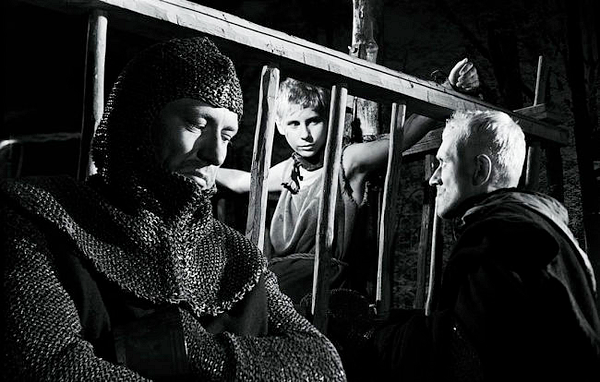
Bergman’s separation between the church and faith is further exemplified through the character of Jof, one of Antonius’s fellow travelers. Unlike knights, monks, or fanatics, Jof does not belong to the church. However, he emerges as the most spiritually inclined character in the film. In the early part of the story, Jof experiences a vision of the Virgin Mary and baby Jesus. Although his wife, Mia, grows weary of hearing about his visions, Jof remains confident in their authenticity. Later on, Jof is the only character to witness Antonius playing chess with Death.
Through Jof, Bergman suggests that one can lead a spiritual life without having a direct connection to the church. Jof’s character highlights the possibility of finding spiritual fulfillment outside of religious institutions. It implies that living a spiritual life independent of organized religion may even be a preferable approach.
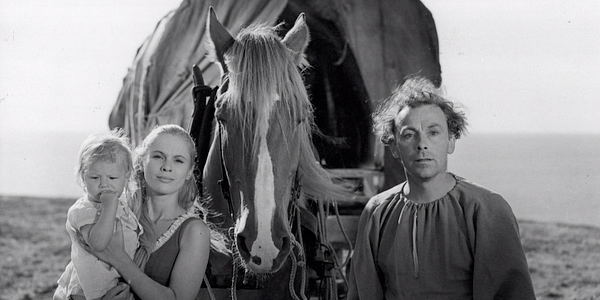
Personally I’ve found distaste in the modern capitalistic nature of religious activities, which based their beliefs into some kind of “business”, and it’s been a real reason I’ve struggled with my faith. Bergman, having experienced a strictly religious upbringing, likely encountered similar challenges, which may have fueled his skepticism. Jons, with his carefree atheism, represents an ideal of freedom from doubt that you find appealing. On the other hand, Jof embodies the ideal Christian, displaying a bright personality, love for his family, and unwavering faith.
As Antonius grapples with his existential crisis, he becomes determined to perform one final meaningful act before the chess match, symbolizing the end of his life, concludes. In a selfless act, during the climactic moment of the match, Antonius disrupts the game, sacrificing the board that represents his life, in order to enable Jof and Mia’s escape into the night. After witnessing Death, Jof realizes the need for him and his family to leave in order to survive.
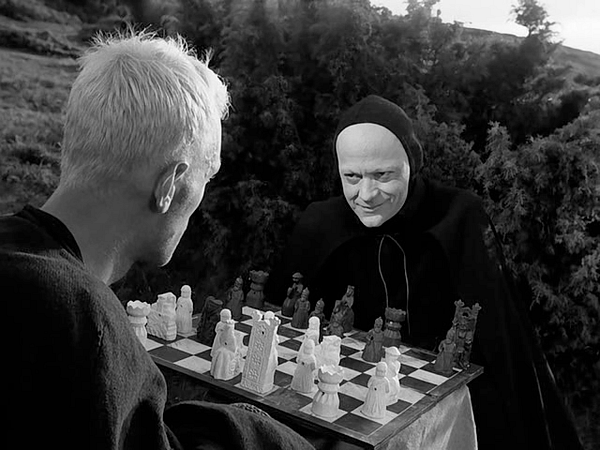
While The Seventh Seal deals very directly with Death and doom, it’s thankfully hilarious. Bergman has made several comedies, such as “A Lesson in Love” and “Smiles of a Summer Night”, which I’ve admittedly not seen yet, but it makes sense considering how funny this film is. Specifically Jons’s character. He makes me laugh a lot, from the way he scoffs at Antonius behind his back, to how he helps Plog.
As Jons and Antonius encounter Jof and Mia, the blacksmith Plog and his wife Lisa are also introduced. Lisa sneaks away to engage in a sexual encounter with Jof’s friend, which sends Plog into a frenzy as he searches for her. He seeks Jons’ help, but Jons refuses, expressing his disdain for women. Jons doesn’t believe in God or love, and he tries to persuade Plog to forget about his cheating wife. This scene, filled with humor, brings a lively moment to the film and brightens the perspective amidst its themes of death. Plog and Lisa’s conflict, while not offering a specific perspective to the audience, is both humorous and relatable, showing Bergman’s skill in capturing the essence of life even in a film centered on death.
Another character worth mentioning is the Mute Girl, who is saved by Jons when he intervenes to prevent her from being assaulted by a grave robber. Jons offers her companionship, and although she reluctantly joins their company due to having nowhere else to go, her presence adds an important perspective on death. This moment solidifies Jons as your favorite character, showcasing his complex nature and highlighting the contrast between his stated dislike for women and his willingness to save a life.
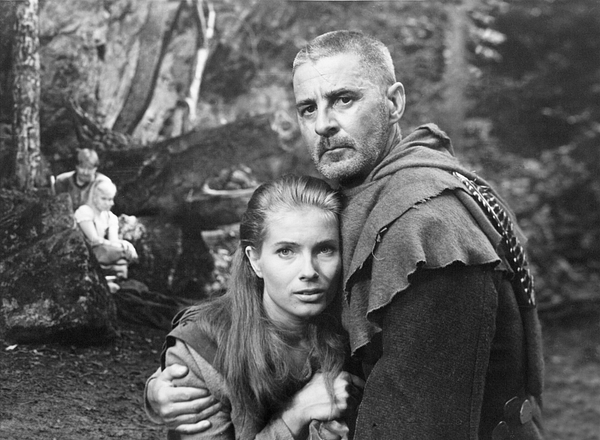
The climactic final scene of “The Seventh Seal” lingers in one’s memory, expertly crafted by Bergman to evoke haunting emotions. The preceding storm serves as foreshadowing for the encounter with Death. As the characters continue their journey towards Antonius’s home, the film builds up to this powerful moment.
In this concluding scene, every character on screen delivers phenomenal and timeless performances, showcasing their depth of emotion. The Mute Girl’s reaction to Death is particularly striking. Despite having endured a difficult life, unable to express her pain through words or convey her needs, she appears almost relieved or even happy to see Death. Perhaps she sees it as an escape from a world that has worn her down. The Mute Girl symbolizes those who are broken, those who may be ready for the end. While it may be a somber reality, encountering individuals who feel this way is not uncommon. Witnessing their perspective can be heartbreaking, yet it highlights the complexities of human existence.
The Mute Girl’s silent utterance of the words “It is finished” further emphasizes her resignation and acceptance of the finality of life. It adds a poignant layer to the scene, underscoring the themes of mortality and the various perspectives on death that Bergman explores throughout the film.
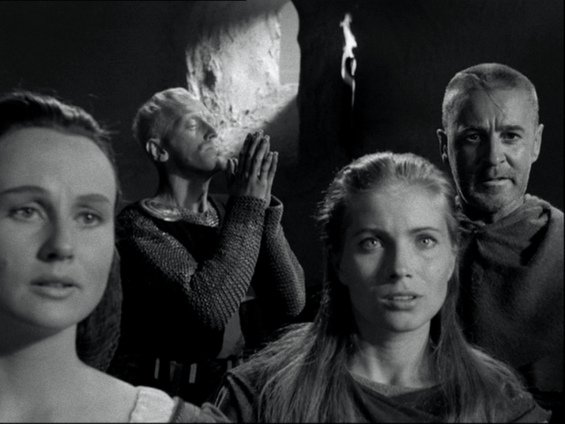
In this pivotal scene, Jons chooses not to confront Death directly but instead looks directly at the camera, indicating his preparedness for this moment. He has lived his life to the fullest, unafraid of death, and in this final moment, he accepts his fate reluctantly. Jons refuses to idolize Death, demonstrating his defiance and independence of spirit. On the other hand, Antonius, whom I personally identify with the most, mirrors the fear and horror that many face when confronted with death. He fervently prays to a God he may not fully believe in because he feels it is his only recourse. Antonius’s reaction reflects the genuine uncertainty and trepidation that Bergman anticipates in the face of the great unknown.
Meanwhile, Jof and Mia, having successfully escaped the forest and the storm, continue their journey. Jof catches a final glimpse of their traveling companions, who are engaged in The Dance of Death. This dance alludes to the medieval artistic genre known as The Danse Macabre, which symbolizes the universality of death. However, in this depiction, the Dance of Death takes on a joyous quality, perhaps hinting at a more accepting and embracing attitude towards mortality.
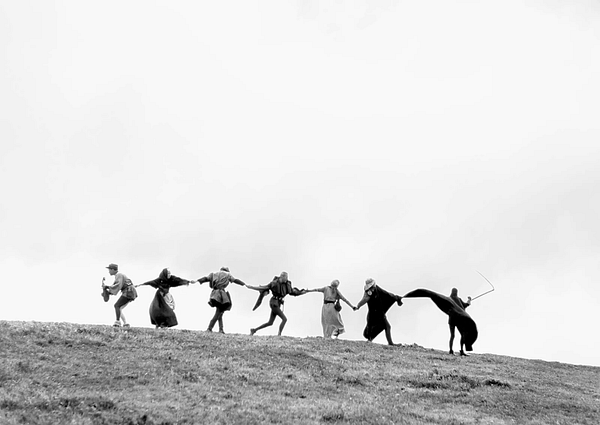
Maybe Bergman thought his audience would be unhappy with such an uncertain ending and added this scene for closure. It’s possible. But I’d like to believe that Bergman has faith that death can be positive. It’s without a doubt final and maybe that’s a good thing. This film taught me a lot about film itself and it also taught me that I love films about spirituality and faith. Like “Stalker” and ‘First Reformed”, all films I love but I didn’t really make this connection for myself until I watched The Seventh Seal. All of these movies deal with the same emotions but I think it’s because of how directly Bergman deals with death and faith, and the energy and emotion I experienced from this film helped open my eyes to what is undoubtedly my personal favorite subject for films to handle. The universality of a spiritual dilemma, or the fear of death which forever haunts audiences, and especially me.
One thought on “My Thoughts on Bergman’s The Seventh Seal, a Life-Affirming Film about Death and Spiritual Dilemma”